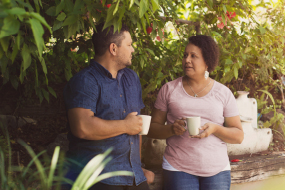The busy pace of life, together with its many day-to-day challenges, can make it easy to forget to take good care of yourself. This may be especially so when balancing a volunteer role with various other commitments. For many volunteers, an experience with cancer, either personally or with someone close to you, may present new and unexpected challenges. Looking after yourself, also known as self-care, is essential to our wellbeing as people. Self-care helps us to cope better with the competing demands of life and makes it less likely that we will turn to ineffective and sometimes harmful ways of coping. From time to time, it’s helpful to revisit what self-care is and how to cultivate wellbeing.
Your wellbeing bank account
Think of your wellbeing like a bank account. Your account stays in credit if you look after yourself well, that is, when you put ‘deposits’ in your account. When we’re facing additional demands such as supporting others, volunteering our time, and any other life challenges, we are likely to take more out of our account than usual. If at the same time, we are putting less into our account by not looking after ourselves, our wellbeing account will soon be drained and in deficit.
How to build your wellbeing account
There are many, many ways to build your wellbeing account. Variety and flexibility can help you to keep motivated, as well as tapping into strategies that are enjoyable and rewarding.
Here are a few tips to get your started:
Do enjoyable activities: Even though you may be extra busy and feel as if you are pushed for time, it is important to create spaces in each day for relaxation and enjoyment. Think about things you do (or have done in the past) that help you to relax and feel good. It might be half an hour spent reading the newspaper, being in the garden, reading a good book, or listening to relaxing music. These activities are not luxuries, they are an important way to prevent the build-up of stress.
Be active: Physical activity has been shown to be an effective way to lift mood, lower blood pressure, improve sleep and reduce stress. Try to keep up some regular physical activity as part of your routine. Be active at a level that is comfortable for you, even small amounts of activity can help. If you are changing your usual pattern of physical activity and/or have health issues to consider, it is important to talk to your doctor about this first.
Healthy eating: Eating healthily gives your body better fuel to cope with the demands of life. For those who have undergone cancer treatment, it assists with the ongoing process of recovery. Try to make sure that your diet is balanced, with plenty of vegetables and fruit, healthy carbohydrates that are low in fats and sugar (bread, pasta, rice, cereals), and protein (lean meat, eggs, milk, beans/lentils). Keep alcohol and caffeine (in coffee, soft drinks, and tea) to a minimum. Talk with your doctor or a dietician for eating tips if illness, recovery or specific dietary needs are affecting your appetite or ability to eat well.
Build good sleep habits: Research shows that good sleep habits improve our mood. Try going to bed at a regular time and build habits into your sleep routine like turning off screens at least an hour before bed.
Practice gratitude: Gratitude has been shown to boost wellbeing. To increase feelings of gratitude, write a list of things that you are grateful for or keep a gratitude journal.
Build a support circle: Develop a support network around you of people you can open up to. It may include a trusted friend, your doctor, a work colleague or your peer volunteers. Talking to others can help you to make sense of how you are feeling.
Address any unhelpful thinking: The way we think about a situation often adds to our stress. Take a step back and look at a problem from a different viewpoint. This can help us keep our reactions in check and cope better. If you find you are experiencing difficult thoughts and feelings, reach out to talk with someone you trust. This may be a partner, close friend or your doctor.
Bring awareness to the present moment: Commonly known as ‘living mindfully’, focussing on the here and now can help you to let go of worries concerning the past and the future. Start a simple practice of bringing awareness to day-to-day activities such as drinking a cup of tea or taking a walk. Turn your attention purposefully to these activities, engaging in them fully and without judgment. Cultivating this habit can help you to really notice the special elements of day-to-day life that can be easily overlooked if we are distracted by thoughts other than what is right before us in any given moment.
Remember, looking after yourself will build your wellbeing bank account and help you to cope better with the demands of life.
If you are experiencing challenges due to a cancer-related experience, you can gain support by phoning our 13 11 20 Support and Information line. For support regarding your volunteer role, please contact the volunteer hotline on 1300 851 957.

